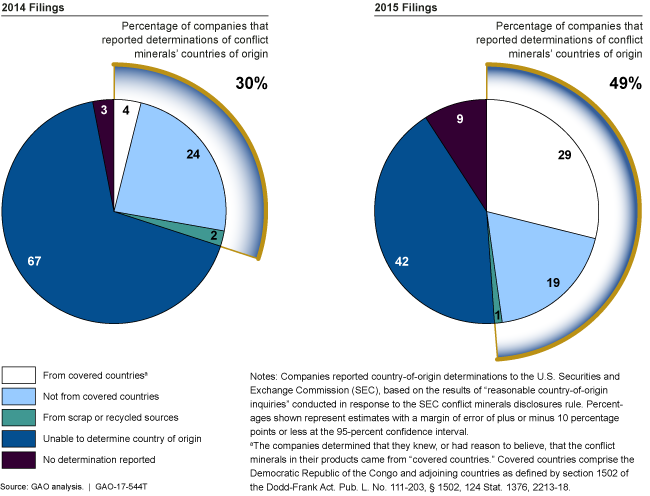Conflict Minerals: Insights from Company Disclosures and Agency Actions
Fast Facts
The mining and trade of "conflict minerals"—particularly tin, tungsten, tantalum, and gold from the Democratic Republic of the Congo—has contributed to severe human rights abuses. In 2012, the Securities and Exchange Commission began to require companies whose products may contain these four minerals (from the DRC and its neighboring countries) to report on the sources of these minerals.
In this Statement for the Congressional Record, we report that about half of companies in our sample reported this source information in 2015—an increase of 19% from 2014.
Percentages of Companies That Reported Determinations of Conflict Minerals' Origins, 2014 and 2015

Side-by-side pie charts showing data from SEC filings in 2014 and 2015.
Highlights
What GAO Found
Our analysis of a generalizable sample of conflict minerals disclosures filed with SEC in 2015 found that an estimated 49 percent of companies in 2015 reported having determined whether the conflict minerals in their products came from covered countries, compared with 30 percent in 2014—an increase of 19 percentage points. As a result of due diligence, a majority of companies reported in 2015 that they were unable to determine the country of origin of the conflict minerals in their products and whether such minerals benefited or financed armed groups in the covered countries. However, companies reported a range of actions they had taken, or planned to take, to build on or improve their due diligence efforts, such as shifting operations or encouraging those in their supply chain to shift from current suppliers to suppliers who are certified as conflict free.
As of July 2016, the Department of Commerce (Commerce) had not submitted to Congress a report that includes an assessment of the accuracy of Independent Private Sector Audits (IPSA) and other due diligence efforts as well as recommendations for IPSA processes, as the Dodd-Frank Act requires, and had not developed a plan for doing so. Commerce officials told us in July 2016 that they had not yet assessed the accuracy of the four IPSAs filed in 2014 or the six IPSAs filed in 2015. Commerce officials said they established a team to manage Commerce's responsibilities related to IPSAs in March 2016, but the officials noted that they did not have the internal knowledge or skills to review IPSAs or establish best practices.
Why GAO Did This Study
Armed groups in eastern DRC continue to profit from the exploitation of minerals, according to the United Nations. Provisions in the 2010 Dodd-Frank Wall Street Reform and Consumer Protection Act require that U.S. agencies take certain actions. For example, the act requires, among other things, SEC to promulgate regulations regarding the use of conflict minerals from the DRC and adjoining countries. The act also requires Commerce to submit a report that includes an assessment of IPSAs filed in conjunction with SEC disclosures. As we reported in 2015, U.S. agencies have supported a range of initiatives; for example, strengthening traceability mechanisms that minimize the risk that minerals that have been exploited by illegal armed groups will enter the supply chain.
Based on an August 2016 report (GAO-16-805), this statement examines (1) company disclosures filed in 2015 in response to the SEC conflict minerals regulations and (2) Commerce's actions regarding its conflict minerals-related requirements under the Dodd-Frank Act. GAO analyzed a generalizable random sample of Specialized Disclosures (Form SDs) filed with SEC and interviewed relevant officials for that report.
Recommendations
In its August 2016 report, GAO recommended that Commerce establish a plan outlining steps and time frames for assessing the accuracy of due diligence processes such as IPSAs, and developing the necessary expertise to fulfill these requirements. Commerce concurred with GAO's recommendation.
